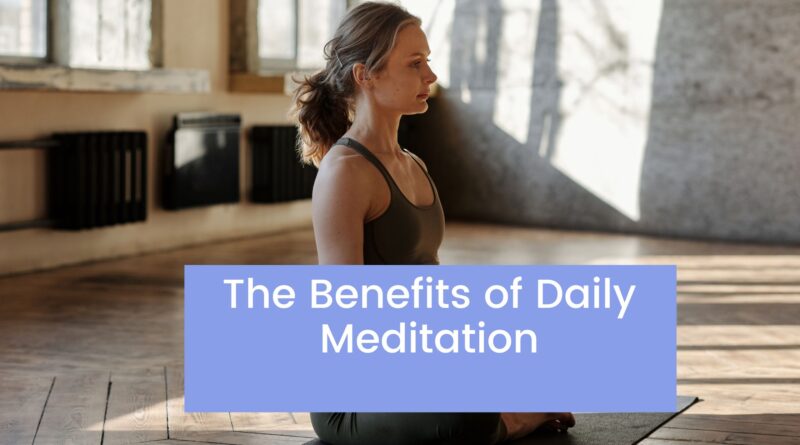The Benefits of Daily Meditation and How to Get Started
In our fast-paced and hectic lives, finding moments of peace and calm can be challenging. This is where daily meditation comes in. Meditation is a practice that has been used for centuries to cultivate mental clarity, emotional balance, and overall well-being. In this blog post, we will explore the numerous benefits of daily meditation and provide you with practical tips on how to incorporate this powerful practice into your daily routine.
Advantages of Daily Meditation:
Reduced Stress and Anxiety: Daily meditation helps activate the body’s relaxation response, reducing the production of stress hormones like cortisol. This can lead to a decrease in anxiety levels and an overall sense of calmness.
Improved Focus and Concentration: Regular meditation has been shown to enhance cognitive function, including improved focus, attention, and memory. It trains the mind to stay present and resist distractions, leading to increased productivity in daily tasks.
Enhanced Emotional Well-being: Meditation cultivates self-awareness and helps individuals observe their thoughts and emotions without judgment. This practice can lead to greater emotional stability, improved mood, and a more positive outlook on life.
Promoted Physical Health: Studies have found that daily meditation can have a positive impact on physical health. It can lower blood pressure, strengthen the immune system, and reduce the risk of heart disease. Meditation has also been associated with pain reduction and improved sleep quality.
Boosted Creativity and Problem-Solving: By quieting the mind and reducing mental clutter, meditation creates space for new ideas to arise. It enhances creativity and can help individuals approach problem-solving with a fresh perspective.

Disadvantages of Daily Meditation:
Requires Commitment and Consistency: To experience the full benefits of meditation, a consistent practice is necessary. It can be challenging to maintain a daily routine and find the time and motivation to meditate regularly.
Initial Difficulty Quieting the Mind: For beginners, it can be challenging to quiet the mind and focus on the present moment. It may take time to train the mind to let go of distractions and thoughts.
Time Constraints: Some individuals may find it difficult to make time for daily meditation, especially when juggling busy schedules and responsibilities. However, even a few minutes of meditation each day can still be beneficial.
Results Take Time: Meditation is not a quick fix. It requires patience and persistence to experience its full effects. Results may vary, and it may take time for individuals to notice significant changes in their well-being.
Frequently Asked Questions (FAQ):
Q1: How long should I meditate each day?
A: It’s recommended to start with a few minutes of meditation each day and gradually increase the duration as you become more comfortable. Even 10-15 minutes of daily meditation can have significant benefits.
Q2: What’s the best time of day to meditate?
A: The best time to meditate is whenever you can set aside a quiet and uninterrupted period. Some people prefer mornings to start their day with a calm mind, while others find evenings helpful for relaxation and reflection.
Q3: Can I meditate if I have a busy mind?
A: Absolutely! Having a busy mind is common, especially when starting meditation. The practice is about observing your thoughts without judgment and gently returning your focus to your breath or chosen meditation technique.
Q4: Do I need any special equipment to meditate?
A: No, you don’t need any special equipment. All you need is a quiet space and a comfortable place to sit. However, some people find meditation cushions or benches helpful for maintaining a comfortable posture.
Q5: Are there different types of meditation?
A: Yes, there are various types of meditation, such as mindfulness meditation, loving-kindness meditation, etc.




